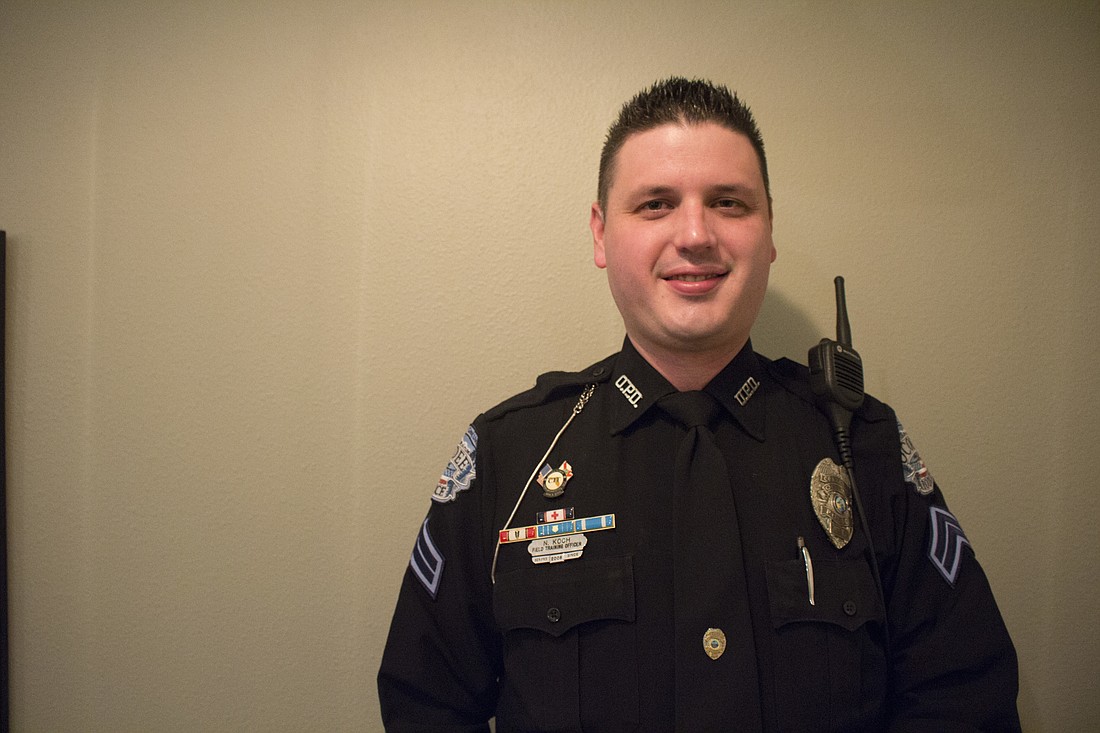- December 26, 2024
-
-
Loading

Loading

It was around three in the morning. The parking lot of the Oak Forest apartment complex was dark.
Nathan Koch, an Ocoee police officer, was one of the first officers who responded to the scene, where neighbors reported gunshots. Upon arrival, Koch was called over by his fellow officers to a location where a man sat on a curb slowly rocking back and forth.
There was blood everywhere; the man had multiple gunshots wounds. One bullet had penetrated a lung, making its way straight through his chest and out his back.
The hole was larger than a nickel. Given what they’d learned in routine police training, Koch and everyone surrounding him realized what that meant.
It was a sucking chest wound — a dangerous, complicated injury that can kill most within 10 minutes. With this type of injury, the lung breathes from the path of least resistance — the wound itself.
Knowing they only had minutes before it would be too late, Koch went to work doing what he could to help save the man’s life. Proper occlusive dressing — a type of dressing that uses a waxy coat rather than an absorbent gauze pad to create an air-tight seal — was unavailable. So, he used a tactic he learned while attending to victims in the Pulse tragedy that uses AED pads to seal sucking chest wounds.
“I learned it at Pulse. Probably, like four or five people into it, we ran out of occlusive dressing,” Koch said. “And it was just such a high volume of people. So one of the paramedics told me — and I don’t even know the paramedic’s name to this day because there were so many people — he advised to cut the cords. And I was like, ‘Why am I cutting the cords? It’s going to be useless if I put these on.’ I was thinking we were using it to restart someone’s heart. And he was like, just cut them! And then a little after I understood where he was going with it as we were using them.”
Because AED pads are adhesive, they are able to create the tight seal needed to close a sucking chest wound and help a victim breathe normally via their esophagus again. That life-saving trick Koch learned in those few hectic moments have remained in Koch’s memory. After that day, he asked the Ocoee Fire Department for any outdated AED pads they were planning to discard.
To this day, Koch has not spoken to the man whose life he helped save. He’s aided in the process of saving many lives before and expects he likely will help save many more to come given his line of work. A police officer’s initial treatment of potentially fatal injuries usually is critical in helping people reach a hospital in time.
But Koch insists it’s not just him who deserves credit. Rather, it’s everyone who makes it their duty to involve themselves in a life-or-death situation.
“It wasn’t just me,” Koch emphasized repeatedly. “It was the other cops, the firefighters, the paramedics, the doctors, the nurses. In all honesty, those are the true heroes in the battle because I’m not a surgeon. I can’t do surgeries in the field. They’re the ones who are the true heroes.”
Correction: A previous version of this article incorrectly spelled Nathan Koch's last name as "Coch." It has since been modified.
––––
Contact Gabby Baquero at [email protected].